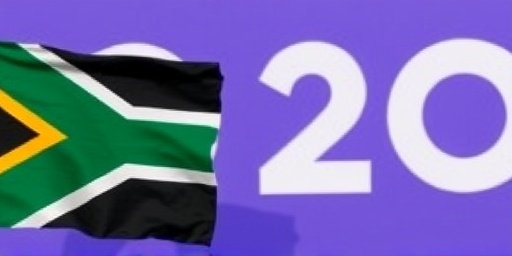In a bold move underscoring shifting global alliances, South Africa hosted the G20 summit in Johannesburg, where 18 member nations and the European Union swiftly adopted a comprehensive declaration on Tuesday. The landmark document addresses pressing issues like climate change, global inequality, and economic recovery for developing nations, even as the United States boycotted the event due to escalating diplomatic tensions. This U.S. boycott marks a rare fracture in the world’s premier economic forum, highlighting divisions over trade policies and international sanctions.
- G20 Declaration Targets Climate Change with Ambitious Funding Pledges
- U.S. Boycott Exposes Cracks in Global Diplomacy Over Trade and Sanctions
- Global Inequality Takes Center Stage as Developing Nations Demand Reforms
- Economic Recovery Strategies Highlight Innovation and Trade for Emerging Markets
- Future G20 Agenda Signals Deeper Reforms Amid Shifting Alliances
The summit, attended by leaders from countries including China, India, Brazil, and Germany, opened amid heightened security and optimistic tones from host President Cyril Ramaphosa. “Today, we reaffirm our commitment to a multipolar world where the voices of the Global South are not just heard but heeded,” Ramaphosa declared in his opening address, emphasizing South Africa’s role as the first African nation to chair the G20 since its inception in 1999.
With the global economy still reeling from the aftershocks of the COVID-19 pandemic and geopolitical conflicts, the declaration calls for urgent reforms in international financial institutions. It proposes increasing funding for climate adaptation in vulnerable nations by at least $100 billion annually, a figure that experts say falls short of the $1 trillion needed but represents a significant step forward.
G20 Declaration Targets Climate Change with Ambitious Funding Pledges
The heart of the adopted declaration lies in its robust stance on climate change, a topic that has dominated international discourse since the COP28 summit last year. South Africa, itself a coal-dependent economy transitioning to renewables, positioned the G20 as a catalyst for actionable change. The document outlines a “Green Recovery Framework” aimed at mobilizing $500 billion in green investments by 2030, focusing on solar and wind projects in Africa and Asia.
According to a report from the World Bank released just prior to the summit, climate change could cost the global economy up to 2.6% of GDP annually by 2030 if unaddressed. The declaration responds by urging G20 members to phase out fossil fuel subsidies, currently totaling $1.3 trillion globally each year, and redirect those funds toward sustainable development. Indian Prime Minister Narendra Modi, speaking virtually, praised the initiative: “This is not just about numbers; it’s about saving our planet for future generations. India commits to doubling its renewable capacity to 500 gigawatts by 2030.”
Environmental groups like Greenpeace have lauded the move but called for more. “While the pledges are welcome, enforcement mechanisms are weak,” said Kumi Naidoo, executive director of Amnesty International’s climate campaign. “South Africa’s leadership must ensure these words translate into deeds, especially as the U.S. absence weakens the group’s leverage.”
In practical terms, the framework includes bilateral agreements between South Africa and Brazil for technology transfer in carbon capture systems. Statistics from the International Energy Agency indicate that such collaborations could reduce emissions by 15% in developing nations over the next decade. The summit’s climate session also featured data-driven discussions, with projections showing that unchecked global warming could displace 1.2 billion people by 2050, disproportionately affecting G20 members like Indonesia and South Africa.
U.S. Boycott Exposes Cracks in Global Diplomacy Over Trade and Sanctions
The U.S. boycott of the G20 summit in South Africa has sent ripples through international relations, rooted in longstanding diplomatic tensions exacerbated by recent U.S. sanctions on Russian energy exports and disputes over African trade deals. President Joe Biden’s administration cited “irreconcilable differences on core economic principles” as the reason for non-attendance, with U.S. Treasury Secretary Janet Yellen issuing a statement: “The United States remains committed to G20 principles but cannot participate in forums that undermine democratic values and fair trade.”
Analysts point to the U.S. frustration with the G20’s growing tilt toward BRICS nations—Brazil, Russia, India, China, and South Africa—which have expanded their bloc to include Egypt, Ethiopia, Iran, and the UAE. This expansion, formalized earlier this year, challenges Western dominance in global finance. A boycott like this is unprecedented since the G20’s emergency summits during the 2008 financial crisis, where U.S. leadership was pivotal in stabilizing markets.
The absence has practical implications for the global economy. Without U.S. input, discussions on digital currencies and supply chain resilience lacked the tech giant’s perspective, potentially delaying innovations like a unified G20 digital payment system. Economists from the IMF warn that such divisions could slow global GDP growth by 0.5 percentage points in 2024. South African Foreign Minister Naledi Pandor responded diplomatically: “The G20 is bigger than any one nation. Our declaration moves forward, inclusive of all voices present.”
Behind the scenes, whispers of bilateral meetings between U.S. allies like the UK and France with boycotting officials suggest backchannel efforts to mend fences. However, the U.S. stance aligns with its broader strategy to counter China’s influence in Africa, where Beijing has invested over $300 billion in infrastructure since 2000.
Global Inequality Takes Center Stage as Developing Nations Demand Reforms
Addressing global inequality emerged as a cornerstone of the G20 summit, with South Africa championing reforms to the World Trade Organization (WTO) and International Monetary Fund (IMF). The declaration demands a review of voting shares in these bodies, where developing nations hold only 40% despite representing 85% of the world’s population. “Inequality is not inevitable; it’s a policy choice,” stated Brazilian President Luiz Inácio Lula da Silva during a panel on economic justice.
Key proposals include debt relief for low-income countries, where public debt has surged to 64% of GDP post-pandemic, according to UN data. The summit pledged $50 billion in concessional loans for education and healthcare in Africa and Latin America, targeting the 700 million people still living in extreme poverty. South Africa’s own experiences with apartheid-era inequalities lent authenticity to the discussions, with Ramaphosa highlighting how the nation’s Gini coefficient—0.63, the world’s highest—mirrors broader global disparities.
Quotes from African Union Chair Moussa Faki Mahamat underscored the urgency: “The global economy cannot recover equitably without centering the continent that holds 30% of the world’s minerals essential for green tech.” Sessions delved into specifics, such as tariff reductions on agricultural exports from sub-Saharan Africa, which could boost regional incomes by $20 billion annually, per World Bank estimates.
Civil society representatives, including those from Oxfam, pushed for progressive taxation on multinational corporations. The declaration endorses a global minimum tax of 15% on corporations, building on OECD agreements, but critics argue enforcement remains elusive without U.S. buy-in.
Economic Recovery Strategies Highlight Innovation and Trade for Emerging Markets
The G20’s focus on economic recovery for developing nations brought innovative strategies to the forefront, emphasizing resilient supply chains and digital inclusion. South Africa’s summit agenda featured workshops on post-pandemic rebuilding, with a spotlight on Africa’s intra-continental trade, which stands at a mere 18% compared to Europe’s 70%.
The African Continental Free Trade Area (AfCFTA), launched in 2021, was hailed as a game-changer, potentially adding $450 billion to Africa’s GDP by 2035. Chinese Premier Li Qiang committed $10 billion in investments for AfCFTA infrastructure, including high-speed rail linking Johannesburg to Nairobi. “Cooperation, not confrontation, drives the global economy,” Li said, countering U.S. boycott narratives.
Statistics from the African Development Bank reveal that G20 support could create 30 million jobs in green sectors across the continent. Discussions also covered fintech solutions, with India’s UPI model proposed for replication in South America, aiming to bank the 1.7 billion unbanked adults worldwide.
Challenges persist, however. Inflation in emerging markets hit 10.4% in 2023, per IMF figures, fueled by energy price spikes from the Russia-Ukraine conflict. The declaration calls for diversified energy sources, blending nuclear and hydro with fossils during transition phases.
European Commission President Ursula von der Leyen emphasized multilateralism: “Even without full attendance, the G20’s work on economic recovery sets a blueprint for inclusive growth.” Side events showcased success stories, like South Africa’s renewable energy auctions that attracted $14 billion in foreign direct investment since 2011.
Future G20 Agenda Signals Deeper Reforms Amid Shifting Alliances
As the Johannesburg summit concludes, eyes turn to Brazil’s 2024 G20 presidency, which promises to build on South Africa’s momentum with a focus on hunger eradication and gender equality in economic policies. The adopted declaration lays groundwork for annual progress reports, ensuring accountability on climate change commitments and inequality reductions.
Experts foresee intensified U.S.-G20 reconciliation efforts, possibly at the next finance ministers’ meeting in Washington. A Brookings Institution analysis predicts that sustained cooperation could avert a global recession, projecting 3.2% growth if trade barriers ease. South Africa’s diplomatic win bolsters its bid for a permanent UN Security Council seat, while the U.S. boycott may prompt alternative forums like the BRICS summit in Kazan, Russia.
Stakeholders from the private sector, including CEOs from Standard Bank and Alibaba, urged faster implementation: “The global economy thrives on trust; this declaration rebuilds it,” said Arkeeda Hudson, CEO of a Johannesburg-based impact fund. With climate change threats looming—such as the 2023 floods displacing 500,000 in South Africa—the summit’s outcomes could define the decade’s economic trajectory.
Looking ahead, the G20’s evolution toward greater inclusivity may reshape international norms, compelling even absent powers to engage. As Ramaphosa closed the event, he remarked, “History will judge us not by our words, but by our actions in the face of division.” The path forward demands unity, innovation, and resolve to navigate an uncertain world.








